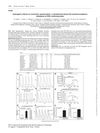 January 2024 in “Biological & clinical sciences research journal”
January 2024 in “Biological & clinical sciences research journal” Apigenin, found in plants and vegetables, has many health benefits, including anti-inflammatory, antioxidant, and anticancer effects.
[object Object]  October 2023 in “Biomedical science and engineering”
October 2023 in “Biomedical science and engineering” Innovative methods are reducing animal testing and improving biomedical research.
 2 citations,
May 2021 in “Stem Cells International”
2 citations,
May 2021 in “Stem Cells International” Human pluripotent stem cells could be used to make platelets for medical use, but safety, effectiveness, and cost issues need to be resolved.
41 citations,
March 2019 in “Circulation research” Adult stem cells are effective and ethically acceptable for treating various diseases.
1 citations,
February 2023 in “Ibrain” Black cumin and its nanoformulations show promise in treating neurodegenerative diseases.
January 2025 in “Cosmetics” Exosomes could improve skin care, but more research is needed to confirm their safety and effectiveness.
 September 2019 in “Journal of Investigative Dermatology”
September 2019 in “Journal of Investigative Dermatology” Scientists used stem cells to create a model of the skin disease Epidermolysis Bullosa simplex, which helped them understand its molecular mechanisms and could aid in finding treatments.
 October 2019 in “European heart journal”
October 2019 in “European heart journal” Androgen-deprivation therapies increase the risk of certain heart conditions, but testosterone treatment may help.
[object Object]  64 citations,
August 2019 in “Circulation”
64 citations,
August 2019 in “Circulation” ADT, especially enzalutamide, may increase the risk of heart rhythm problems and sudden death in men.
 9 citations,
January 2010
9 citations,
January 2010 The herbal hair dye is a safe and eco-friendly alternative to conventional dyes.
 1 citations,
December 2022 in “Biomolecules & therapeutics”
1 citations,
December 2022 in “Biomolecules & therapeutics” Minoxidil may help reduce aging effects in brain cells.
 40 citations,
December 2019 in “Neurobiology of Stress”
40 citations,
December 2019 in “Neurobiology of Stress” Neuroactive steroids show promise for treating mental and neurological disorders by targeting GABA_A receptors.
18 citations,
September 2021 in “Journal of Neuroendocrinology” Neurosteroids can influence behavior by modulating brain inhibition, with potential for treating psychiatric disorders.
 15 citations,
May 2021 in “British journal of dermatology/British journal of dermatology, Supplement”
15 citations,
May 2021 in “British journal of dermatology/British journal of dermatology, Supplement” Cell therapy shows promise for treating severe psoriasis but needs more research to confirm safety and effectiveness.
 1 citations,
November 2015 in “Indian Journal of Clinical Biochemistry”
1 citations,
November 2015 in “Indian Journal of Clinical Biochemistry” The conference presented findings on how vitamin D levels, genetic factors, and lifestyle choices like smoking and yoga affect various health conditions and diseases.
 November 2019 in “Synapse”
November 2019 in “Synapse” Brain-made chemicals can control nerve cell function differently in various parts of a mouse's brain, which may help us understand neurological conditions.
 November 2023 in “ACS Omega”
November 2023 in “ACS Omega” New liposome treatment successfully delivers CRISPR to deactivate a key enzyme in androgen-related disorders.
 17 citations,
August 2019 in “Archives of Cardiovascular Diseases”
17 citations,
August 2019 in “Archives of Cardiovascular Diseases” Low testosterone in men is a risk factor for a specific heart rhythm issue, and testosterone treatment may help prevent it.
 9 citations,
December 2017 in “The Journal of Allergy and Clinical Immunology”
9 citations,
December 2017 in “The Journal of Allergy and Clinical Immunology” New targeted therapies for hair loss from alopecia areata show promise, with personalized treatment expected in the future.
 9 citations,
March 2012 in “Experimental dermatology”
9 citations,
March 2012 in “Experimental dermatology” Natural gene therapy shows promise for treating skin disorders like epidermolysis bullosa.
8 citations,
January 2014 in “PubMed” Researchers made stem cells from human hair follicle cells with better efficiency than from skin cells.
 8 citations,
February 2021 in “Journal of the American Heart Association”
8 citations,
February 2021 in “Journal of the American Heart Association” Medical castration in prostate cancer patients can increase the risk of serious heart rhythm problems, so it's important to monitor heart activity during treatment.
















